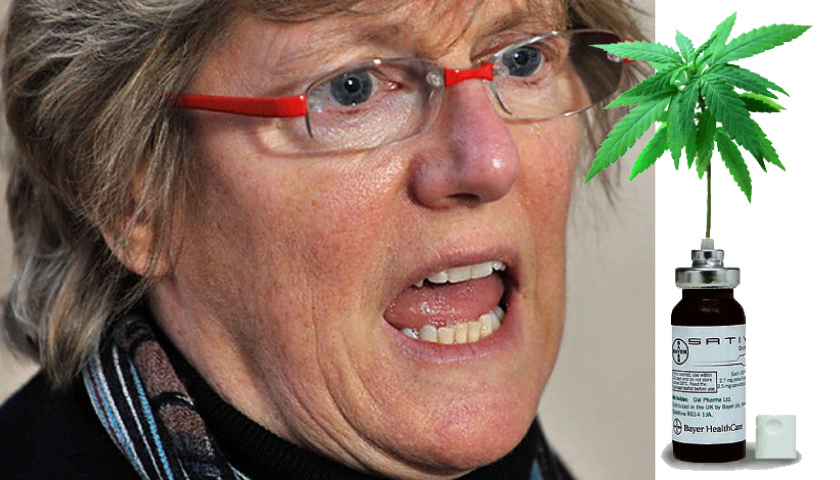Recommendations by a rushed ‘review of reviews’ by Dame Sally Davies, the Chief Medical Officer for England, regarding medicinal cannabis are being implemented by the Home Office, meaning certain ‘cannabis-derived’ medications will be reclassified and doctors will be permitted to prescribe them. Stuart Harper looks at the limits imposed by this small progressive move.
The purpose of Davies’s review was to look at the scheduling of cannabis within the UK, cannabis currently being a schedule 1 substance, with the aim of downgrading its classification if the evidence supported such a position. This part of the review is an expert paper on the status of the current published and verifiable data of the medical efficiency of cannabis for a number of clinical conditions, and the authors own conclusions in light of this evidence (spoiler alert: she thinks it should be medically available in a regulated framework).
It looks at several sources for drawing its conclusions, the most important being: The National Academies of Sciences, Engineering and Medicine, The Current State of Evidence and Recommendations for Research Committee on the Health Effects of Marijuana: An Evidence Review and Research Agenda, the Health Products Regulatory Authority, Cannabis for Medical Use – A Scientific Review, and the Australian Government Department of Health Therapeutic Goods Administration. Most of these studies themselves are drawing on (or reviewing) other studies to reach their own specific conclusions.
While this review is a large and welcome step forward, as a schedule move in the UK would open up many doors both for research and for prescriptive services, especially when made by a current and high-ranking medical expert attached to central government, this is not all positive news.
 While the likelihood of the de-scheduling has drastically increased, and therefore the likelihood that a prescriptive route to cannabinoid medication will ultimately exist, this paper also highlights some remaining hurdles the patients within the cannabis community will have to overcome.
While the likelihood of the de-scheduling has drastically increased, and therefore the likelihood that a prescriptive route to cannabinoid medication will ultimately exist, this paper also highlights some remaining hurdles the patients within the cannabis community will have to overcome.
It recommends, and it is likely, that only licensed cannabinoid based medications, ie Sativex or Bedrocan would be covered in the schedule move, not ‘street cannabis’, nor is it clear on where the law would fall on those consuming cannabis without a prescription, even if for medical use (in other locations, like Canada, restrictions and crackdowns have been seen on ‘unlicensed’ medical use once a governmental accepted access route was established).
Also, from the phrasing of the document, and its sources, it’s highly likely that only certain medical conditions will be covered, and therefore allowed, to access cannabinoid-based medication despite any schedule shift. It should be noted that a schedule shift could see Doctors more easily able to prescribe more licensed cannabinoid medications, even for non-approved conditions, and may well improve EU access to cannabis-based medications (at least in the short term), but the likelihood of having it funded by the NHS will likely be drastically reduced if not for an indicated condition, and likely also subject to NICE recommendations and guidelines.
We also see an unhelpful amount of unnecessary and negative prose included in the paper, specifically referring to recreational consumption being harmful and ‘unwanted in society’, and that unregulated medical use and supply was also potentially so. It makes no suggestion for any medical Right to Grow, and absolves the committee from any responsibility in having to look at either recreational consumption, or its class or schedule. Most telling is the lack of apparent will to assess the schedule of ‘raw’ herbal/street cannabis, even for medical use, thus likely it remaining a schedule 1 substance (with the likely exception of accepted and licensed herbal cannabinoid pharmaceuticals, like Bedrocan).
However, this said, the findings and recommendation of the paper are clear. That Cannabis based medicinal products should be moved out of schedule 1 in the UK. It suggests a move into schedule 2, now confirmed as a likely move by the Home Office, to allow for the ACMD to make a full assessment, likely resulting long-term to a move to schedule 4 alongside Sativex, or a schedule 2 or 3 alongside many other restricted substances.
So despite it being clear that these are good first steps, the UK still has a long way to go in providing fair and equal access to cannabis, and despite the progress with medical access and consumption, the prospect of even medical users growing their own plants, or for recreational access to be reviewed, at least in the short term, remain slight.
If you want to make your feelings known, please contact the APPG or Home Office, as well as your local MP and GP, asking them to make themselves aware of this topic, and how it impacts your life, and the lives for those around you.
Now is the time to make yourself heard!
Follow the UKCSC on social media: Facebook – Instagram– Twitter – Reddit





